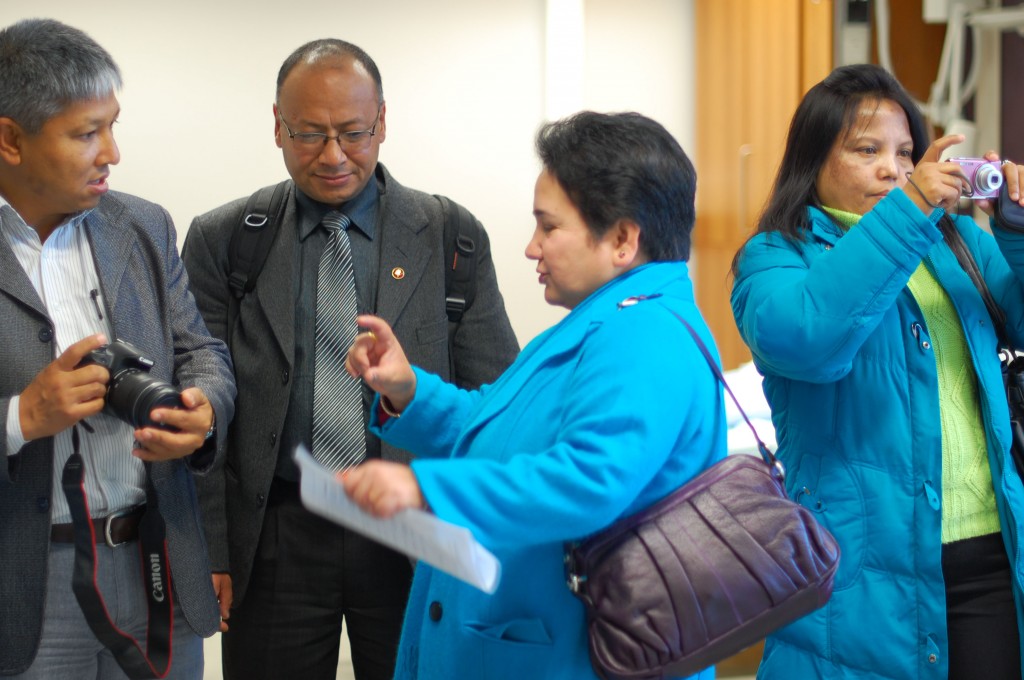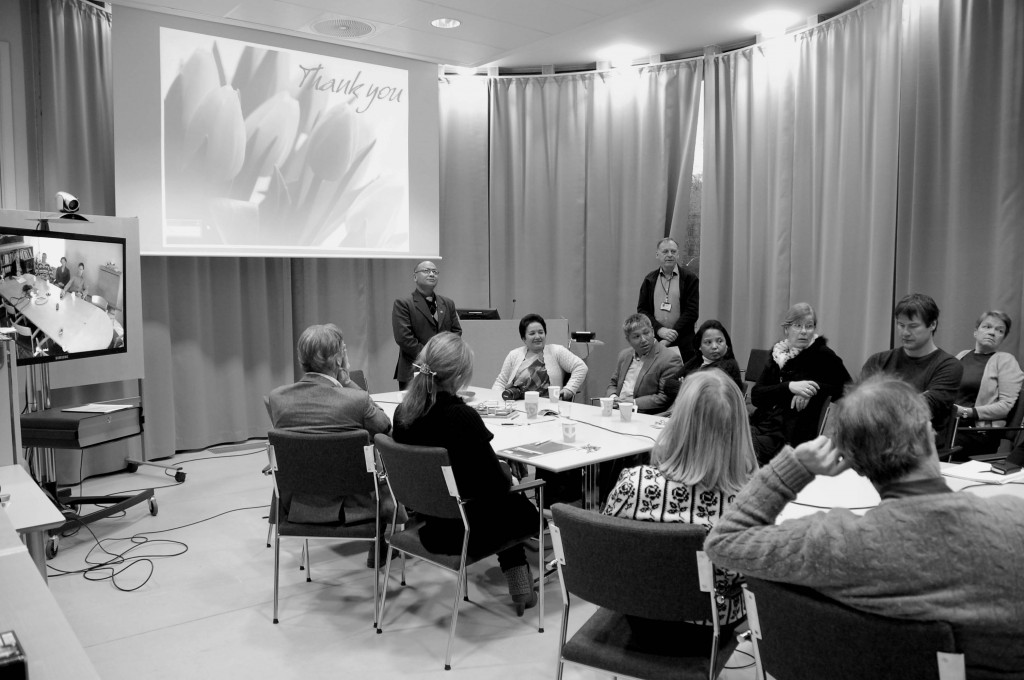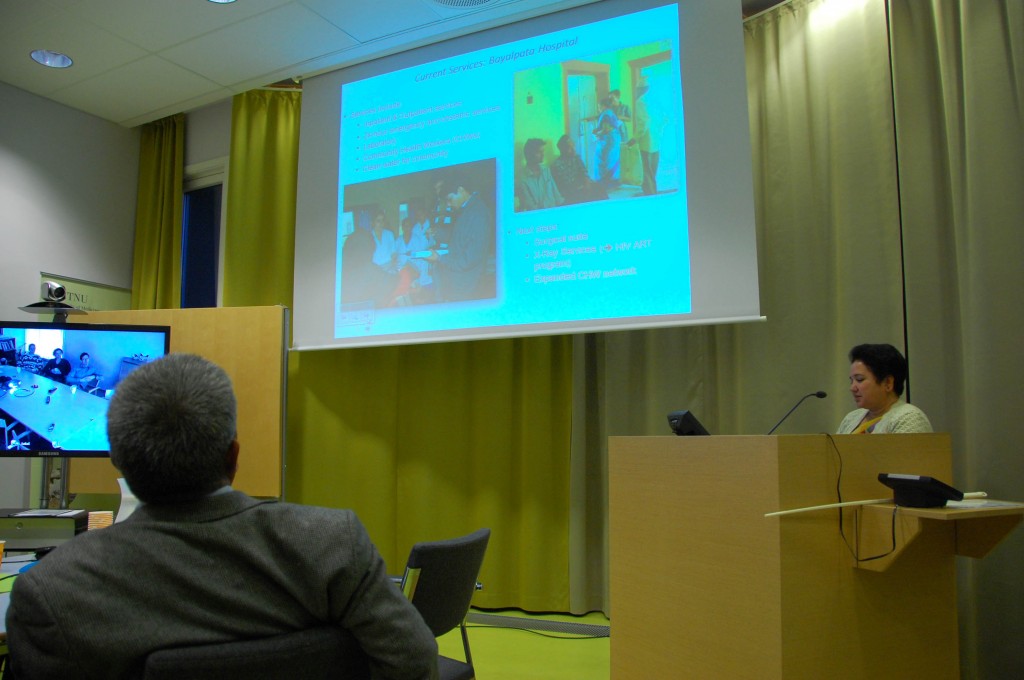Blogger: Jennifer J. Infanti 
The Faculty of Medicine at NTNU is delighted to welcome four doctors/researchers from Nepal to Trondheim between January 15th and 17th. The visiting delegates are members of an international collaboration of researchers investigating strategies to improve antenatal care for pregnant women experiencing domestic violence in Nepal and Sri Lanka. This research team is led by Professor Berit Schei of The Department of Public Health and General Practice and funded by the Research Council of Norway under its GLOBVAC programme.
Domestic violence is a profound global health problem.

At the Obstetrics & Gynaecology Department at St. Olavs Hospital. From left to right, the people are: Dr. Rajendra Koju, Dr. Sunil Kumar Joshi, Dr. Chanda Karki, Dr. Meena Thapa. (Photo: Jennifer Infanti)
The guests from Nepal include Dr. Chanda Karki, Professor in the Department of Obstetrics and Gynaecology and Principal (Dean) of Kathmandu Medical College and Teaching Hospital (KMC); Dr. Meena Thapa, Associate Professor of Obstretics and Gynaecology at KMC; Dr. Sunil Kumar Joshi, Associate Professor in the Medical Education Department at KMC; and Dr. Rajendra Koju, medical doctor at Dhulikhel Hospital and Associate Dean of the Kathmandu University School of Medical Sciences.
Domestic violence is a profound global health problem, posing significant risks for the physical, sexual and psychological health and well-being of women and children in particular. Domestic violence crosses all geographic, economic and cultural barriers and borders. Despite the significant risks of domestic violence for poor health, rigorously conducted research on the interventions, services and policies that work best to prevent and respond to domestic violence is limited.

The four guests from Nepal are standing or sitting from left to right as follows: Dr. Sunil Kumar Joshi (standing), Dr. Chanda Karki, Dr. Rajendra Koju, Dr. Meena Thapa. (Photo: Jennifer Infanti).
In addition, addressing such a widespread public health challenge requires cooperative actions and solutions which bridge many sectors of society – for example, governments, non-profit organisations, researchers, and health care. Professor Schei’s project strengthens the formal partnership of NTNU and Kathmandu University to advance such a cross-cultural exchange of skills, knowledge and experiences to tackle domestic violence.
The visiting doctors/researchers from Nepal will have the opportunity to meet with some of Trondheim’s service providers for victims of domestic violence during their stay, including the Sexual Assault Care Centre team at St. Olavs Hospital, staff at the Trondheim Crisis Centre, and victim support officers and investigators at the police station. In addition, they will be sharing their experiences in obstetrics and public health in Nepal at various meetings and seminars at St. Olavs hospital and NTNU.
Importantly for the research project, the visit will allow time to further develop two PhD proposals – the funding from the Norwegian Research Council for this project will allow two students from Nepal to complete PhD degrees at NTNU over the next three years. The doctoral projects aim to develop culturally and contextually sensitive screening tools to identify pregnant women experiencing domestic violence in antenatal care settings in the Kathmandu area of Nepal. In addition, the PhD students will each develop training and education interventions to support health care professionals in their work with victims of domestic violence. The goal of the interventions is to improve the safety of pregnant women by either reducing the recurrence of abuse or mitigating its impact and consequences.
Professor Schei’s study aligns with the strategic efforts of the Faculty of Medicine at NTNU and St. Olavs Hospital to build competency in the field of global health. The Faculty will benefit from the skills and knowledge of health care practitioners from other countries. With Norway’s population becoming increasingly multicultural, this will help us prepare for patients coming to the hospitals from diverse cultural and ethnic backgrounds, contributing to a more culturally responsive health care system.

